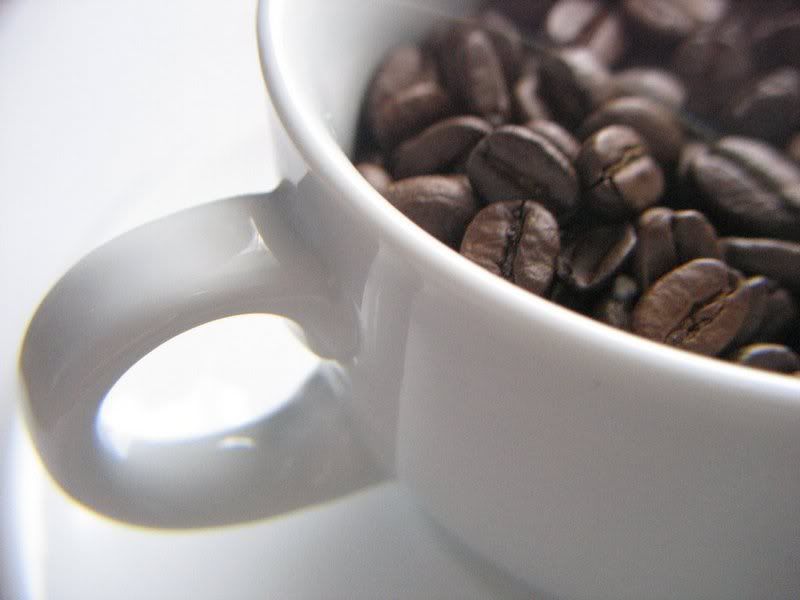 It’s really nice, this coffee stuff, ain’t it? Warms you up on a cold day, keeps you going when the temperature rises, grinds away the rough edges after a hard night and makes the hours at work seem like minutes. The temptation with coffee is to just keep pounding it down but you might not want to do that.
It’s really nice, this coffee stuff, ain’t it? Warms you up on a cold day, keeps you going when the temperature rises, grinds away the rough edges after a hard night and makes the hours at work seem like minutes. The temptation with coffee is to just keep pounding it down but you might not want to do that.According to the American Dietetic Association’s Complete Food and Nutrition Guide, which isn’t much of a bedtime read, “for most healthy adults, moderate amounts of caffeine 200 to 300 milligrams a day, or about two cups of coffee poses no physical problem.”
Okay, so two cups is good. But is three cups of coffee too much? In a word - yes.
According to the boffins who study this kind of thing for a living, you should not only keep it to two cups per day, but you should also actively seek to reduce your caffeine consumption in soft drinks and chocolate, and even over-the-counter and prescription medications. In fact, if there are other factors influencing your health, you might want to go even a step further and reduce the caffeine in your caffeine.
If you-
• Have been substituting coffee in place of water and juice in your diet
• Are having trouble falling asleep
• Are pregnant or nursing a child
• Have a medical condition such as high blood pressure, gastritis, or ulcers
-it’s time to switch to decaf, or even give coffee a miss altogether for a while.
Look, we’re all big fans of the brewed stuff around here. We send it down like water, but we also go to the gym, eat healthily, and take a few hours each night to just sit and relax. Coffee can get you through the stressful times, but if the stresses aren’t dealt with at their root cause, then you’re only going to be stressed again tomorrow.
Make sure that for every coffee you drink, you drink two full glasses of water, to help your system replenish what the caffeine takes out. For every cup of coffee that you NEED to get through the day, sit at home on the couch for one hour every night and read. Doesn’t matter what you’re reading v magazines, books, the back of a cereal box v the point is you need to give your body a chance to slow down and relax naturally.
And, on top of that, ditch the sodas and chocolates altogether. Sure, we know you enjoy them, but you also know full well that they’re doing bad things to your insides.
Ultimately, coffee has to be seen as a trade-off. If you want to enjoy a cup of Joe, look after yourself in other areas and you’ll be sucking down the espressos for decades to come.
The National Soft Drink Association resource of caffeine contents.
A 7 oz cup of coffee has the following caffeine (mg) amounts:
Drip 115-175 mg of caffeine
Espresso 100
Brewed 80-135
Instant 65-100
Decaf, brewed 3-4
Decaf, instant 2-3
Tea, iced 70
Tea, brewed, imported 60
Tea, brewed, U.S. 40
Tea, instant 30
Mate 25-150
The variability in the amount of caffeine in a cup of coffee or tea is relatively large even if prepared by the same person using the same equipment and ingredients day after day.
Caffeine is present in tea leaves and in coffee to the extent of about 4%. Tea also contains two other alkaloids, theobromine and theophylline. These last two relax the smooth muscles where caffeine stimulates the heart and respiratory systems.
The effects of theobromine are, compared to caffeine and theophylline, relatively moderate. However, cocoa contains eight times more theophylline than caffeine. As well, caffeine has been shown to combine with other substances for added potency. Thus the effects of theobromine might be enhanced by the caffeine in chocolate.
Theobromine is highly toxic to dogs and kills many dogs per year via chocolate poisoning. It takes quite a dose to reach fatal levels (more than 200 mg/kg bodyweight) but some dogs have a bad habit of eating out of garbage cans and some owners have a bad habit of feeding dogs candy. A few Oreos won’t hurt a dog, but a pound of chocolate can do considerable damage.
source : www.talkaboutcoffee.com
Comments